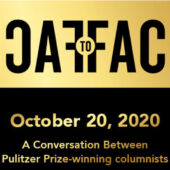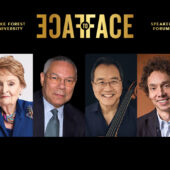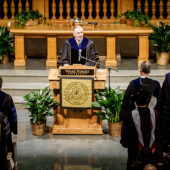IdeasCityWS to lead discussion on workforce development
 IdeasCityWS will host the second in a series of virtual case studies called Beta Bonfires on Nov. 12 at 5 p.m. The focus will be on workforce development.
IdeasCityWS will host the second in a series of virtual case studies called Beta Bonfires on Nov. 12 at 5 p.m. The focus will be on workforce development.Categories: Happening at Wake
 IdeasCityWS will host the second in a series of virtual case studies called Beta Bonfires on Nov. 12 at 5 p.m. The focus will be on workforce development.
IdeasCityWS will host the second in a series of virtual case studies called Beta Bonfires on Nov. 12 at 5 p.m. The focus will be on workforce development.Categories: Happening at Wake
 No matter who you are or where you live, chances are good cancer has touched your life in some way. Today through Oct. 1,Wake Forest University will hold its annual ‘Hit the Bricks’ cancer research fundraiser in honor of Brian Piccolo.
No matter who you are or where you live, chances are good cancer has touched your life in some way. Today through Oct. 1,Wake Forest University will hold its annual ‘Hit the Bricks’ cancer research fundraiser in honor of Brian Piccolo.Categories: Happening at Wake, Pro Humanitate
 “Representation Matters: Art, Space and Racial Restitution,” a webinar co-sponsored by Hanes Gallery, Wake Forest University’s Slavery, Race and Memory Project and Wake the Arts, will be held Wednesday, Sept. 30 from 6 to 7:30 p.m. The panel will be moderated by humanities professor Corey D. B. Walker and feature conversations around the works. The event is free and open to the public. Registration is required.
“Representation Matters: Art, Space and Racial Restitution,” a webinar co-sponsored by Hanes Gallery, Wake Forest University’s Slavery, Race and Memory Project and Wake the Arts, will be held Wednesday, Sept. 30 from 6 to 7:30 p.m. The panel will be moderated by humanities professor Corey D. B. Walker and feature conversations around the works. The event is free and open to the public. Registration is required.Categories: Arts & Culture, Happening at Wake, Inclusive Excellence, Research & Discovery
 The Face to Face Speaker Forum will host Peggy Noonan and Eugene Robinson for a virtual conversation on Tuesday, Oct. 20. The event is free for Face to Face Speaker Forum season subscribers and students, faculty and staff at Wake Forest, as well as students and faculty in the Winston-Salem area.
The Face to Face Speaker Forum will host Peggy Noonan and Eugene Robinson for a virtual conversation on Tuesday, Oct. 20. The event is free for Face to Face Speaker Forum season subscribers and students, faculty and staff at Wake Forest, as well as students and faculty in the Winston-Salem area.Categories: Community Impact, Happening at Wake
 On Monday, May 18, at 7 p.m. (EST), Wake Forest University will hold a Conferring of Degrees ceremony for the Class of 2020.
On Monday, May 18, at 7 p.m. (EST), Wake Forest University will hold a Conferring of Degrees ceremony for the Class of 2020.Categories: Happening at Wake, University Announcements
 This fall, Wake Forest University will launch a signature speaker series called the Face to Face Speaker Forum. This community-facing series will bring world-renowned, influential voices to Winston-Salem to discuss topics in a variety of areas including politics, arts and culture, business and social justice.
This fall, Wake Forest University will launch a signature speaker series called the Face to Face Speaker Forum. This community-facing series will bring world-renowned, influential voices to Winston-Salem to discuss topics in a variety of areas including politics, arts and culture, business and social justice.Categories: Happening at Wake, University Announcements
 Nearly 400 local middle and high school students will gather for the Winston-Salem Regional Science Olympiad tournament at Wake Forest on Saturday, Feb. 29 from 8:30 a.m. to 5:30 p.m. Twenty-five middle and high school teams from eight counties will be competing.
Nearly 400 local middle and high school students will gather for the Winston-Salem Regional Science Olympiad tournament at Wake Forest on Saturday, Feb. 29 from 8:30 a.m. to 5:30 p.m. Twenty-five middle and high school teams from eight counties will be competing. Categories: Experiential Learning, Happening at Wake
 The Medallion of Merit is presented to individuals who have rendered distinguished service to the University, including past presidents, trustees, benefactors, alumni, and retired faculty and administrators. This year Winston-Salem's Dr. Larry Hopkins and Asheville attorney Lou Bissette were honored.
The Medallion of Merit is presented to individuals who have rendered distinguished service to the University, including past presidents, trustees, benefactors, alumni, and retired faculty and administrators. This year Winston-Salem's Dr. Larry Hopkins and Asheville attorney Lou Bissette were honored.Categories: Happening at Wake
 Each February, the Wake Forest University community gathers for Founders’ Day Convocation to observe the founding of the University in 1834. At this year’s event, Wake Forest President Nathan O. Hatch acknowledged the University’s participation in the institution of slavery. He offered an apology for how Wake Forest benefitted from the labor and sale of enslaved people.
Each February, the Wake Forest University community gathers for Founders’ Day Convocation to observe the founding of the University in 1834. At this year’s event, Wake Forest President Nathan O. Hatch acknowledged the University’s participation in the institution of slavery. He offered an apology for how Wake Forest benefitted from the labor and sale of enslaved people.Categories: Happening at Wake, Inclusive Excellence
 What can we learn from the past? Wake Forest University legal scholar and Associate Provost Kami Chavis explains, “If you want to have a transformative institutional change, you have to begin examining the past and the root causes of underlying issues to know what you need to do in the future.” Chavis is also co-chair of the Steering Committee of Wake Forest’s Slavery, Race and Memory Project.
What can we learn from the past? Wake Forest University legal scholar and Associate Provost Kami Chavis explains, “If you want to have a transformative institutional change, you have to begin examining the past and the root causes of underlying issues to know what you need to do in the future.” Chavis is also co-chair of the Steering Committee of Wake Forest’s Slavery, Race and Memory Project.Categories: Happening at Wake, Inclusive Excellence